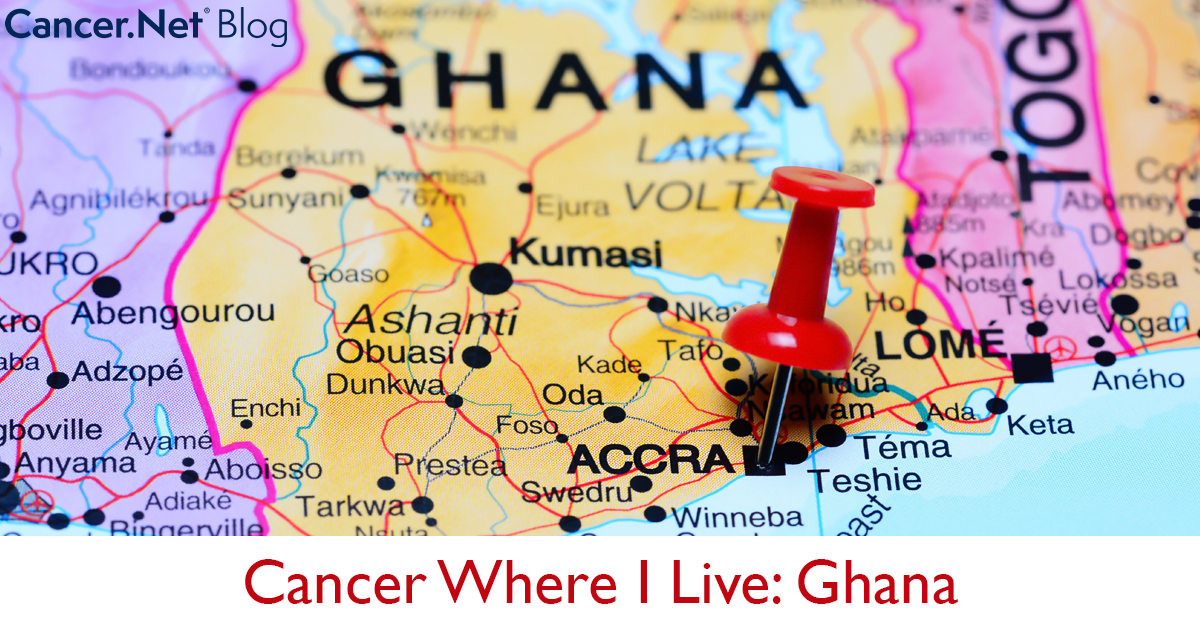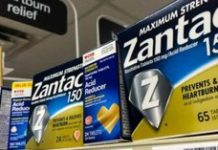
Cancer in My Community is a Cancer.Net Blog series that shows the global impact of cancer and how people work to care for those with cancer in their region. Vivian Paintsil, MBChB, FWACP, FGCPS, is a senior lecturer in the Department of Child Health in the School of Medicine and Dentistry at Kwame Nkrumah University of Science and Technology. Dr. Paintsil is a pediatric oncologist at the Directorate of Child Health at the Komfo Anokye Teaching Hospital (KATH) in Kumasi, Ghana, and is the current head of the Pediatric Oncology Unit at KATH. Her research interests include pediatric renal tumors and survivorship.
Why I care for people with cancer
Before joining pediatric oncology, I envisioned pursuing a career in hematology. But while I was working on the hematology/oncology ward, I found that there wasn’t much attention being paid to childhood cancer, possibly because there was no pediatric oncologist available at that time. I knew pediatric cancers had a high cure rate, and so I thought we should be able to improve the outcomes of children with cancer rather than not treat them.
It was and still is satisfying to see a child who was so sick get up after you start their treatment. I feel that, as doctors, it is our calling to give hope to those whom everyone else has given up on. The smiles on the faces of our little warriors and their families are what motivate me.
What cancer is like in Ghana
Ghana is a lower-middle-income country. Kumasi, where my hospital is located, is the second largest city in the country with a population of 3.7 million people. A cancer diagnosis in my country is always associated with fear and death. And culturally, a lot of people in Ghana feel that cancers are curses on those diagnosed and have a spiritual cause behind them. Because of that, people with cancer often feel they need spiritual interventions before they go to the hospital. This leads to a high rate of advanced disease at diagnosis and a high rate of people who stop their cancer treatment, mostly to seek alternative care.
For pediatric cancers, it is estimated that about 1,200 new cases will be diagnosed every year in Ghana, according to the World Health Organization. However, many people in Ghana still believe that children can’t get cancer, and so a childhood cancer diagnosis is often received with a lot of disbelief and shock.
In Ghana, many of the costs for the diagnosis and treatment of pediatric cancers are paid by families out-of-pocket. So, if caregivers don’t have the money to pay for their child’s treatment, then they tend to abandon that treatment. Lots of people in the country also don’t have easy access to cancer diagnosis and treatment, so they have to travel long distances before they can access any of the 3 comprehensive childhood cancer treatment centers in Ghana. However, in terms of pediatric cancer care, there has been an increase in the number of pediatric oncologists and the different types of multidisciplinary specialists available in the country.
The most common type of pediatric cancer seen in Ghana is leukemia, followed closely by lymphoma, retinoblastoma, and Wilms tumor. Many of the patients we see often come in after the cancer has already reached an advanced stage.
There are a lot of childhood cancer advocacy and education efforts underway in Ghana, especially during international awareness days like International Childhood Cancer Day in February and Childhood Cancer Awareness Month in September. Meanwhile, childhood cancer education is also provided through the radio, TV, and print media, and educational activities are organized at various hospitals throughout the year.
Watching for signs of childhood cancer
It is important for families in Ghana to know the early warning signs and symptoms of childhood cancers so they can seek treatment for their child early. These signs and symptoms can include:
-
Eye changes, such as a white spot in the eye, squinting, loss of sharpness and clarity in vision, and bulging eyes
-
Lumps or swelling anywhere on the body
-
Unexplained weight loss
-
Bleeding
-
Aches and pains in the bones or elsewhere in the body
-
Neurological changes, such as changes in a child’s gait, early morning vomiting, headaches, and changes in a child’s level of consciousness
Parents need to know where they can access care for their children with cancer so that the child can receive a diagnosis as early as possible. Parents can take children to the Komfo Anokye Teaching Hospital in Kumasi, the Korle-Bu Teaching Hospital in Accra, or the Greater Accra Regional Hospital in Accra. It is also important for children and their families to know the importance of sticking with their cancer treatment plan and being aware of the consequences of stopping treatment. Many childhood cancers are curable if they are diagnosed at the early stages, so parents should be encouraged not to delay and to bring their children in as early as possible for treatment.
Where people with cancer in Ghana can find local resources
There are different resources available in Ghana for families who have children with cancer. Resources can be found on the government website for the National Strategy for Cancer Control in Ghana.
Families can also access resources from non-governmental organizations in Ghana, including World Child Cancer, Lifeline for Childhood Cancer in Ghana, and the Dr. Robert Mitchell Memorial Foundation.
The author has no relationships relevant to this content to disclose.







